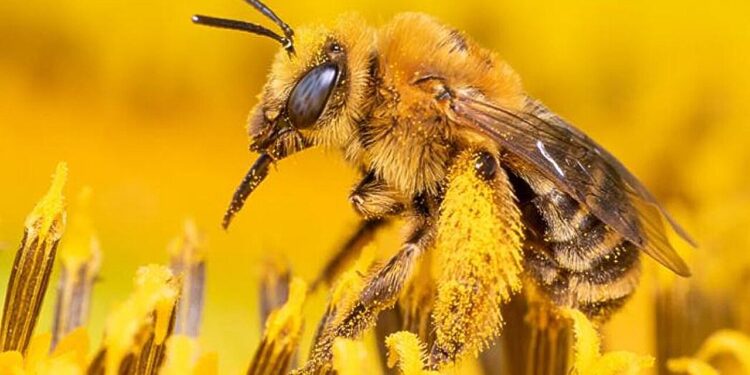Researchers at Rutgers University have detected inadequate pollination in 25 crop species, including sunflower. More frequent visits by bees like this Melissodes trinodis could reduce the observed yield deficits by about two-thirds. Credit: Max McCarthy, Winfree Laboratory, Rutgers University
A team of researchers led by scientists from Rutgers University-New Brunswick analyzed crop yields from more than 1,500 fields on six continents and found that global production of important, nutrient-dense foods such as fruits, vegetables, nuts and legumes is limited by a lack of pollinators.
The results, detailed in Nature Ecology and Evolutionshowed that in various crops and regions, one-third to two-thirds of farms contain fields that do not produce at their normal level due to a lack of pollinators. The phenomenon of low crop yields due to insufficient numbers of insects is known as pollinator limitation.
The study is particularly timely given recent concerns about global declines in insect abundance.
“Our results are a cause for concern and optimism,” said Katie Turo, study author and postdoctoral researcher in the Department of Ecology, Evolution and Natural Resources at the Rutgers School of Environmental and Biological Sciences.
“We have detected widespread yield deficits. However, we also believe that through continued investment in pollinator management and research, it is likely that we can improve the efficiency of our existing crop fields to meet the nutritional needs of our global population.”
The scientists reached their conclusions by statistically analyzing more than 200,000 “bee visits” to cultivated flowers, contained in one of the world’s most comprehensive databases on crop pollination. Rachael Winfree, lead author of the study and a professor in the Department of Ecology, Evolution and Natural Resources, collaborated with several colleagues from Europe and South America to compile the world’s most comprehensive database of crop pollination studies.
The open-source database integrates three decades of field observations of bees and other pollinators visiting plants.
The recent Rutgers study doesn’t apply to major food crops, like rice and wheat, which don’t need pollinators to reproduce. But pollination by bees and other animals is essential to the proliferation of what Turo describes as “nutrient-dense, interesting foods that we love and that are culturally relevant,” like fruits, vegetables, nuts and legumes.
“If you look at a list of crops and think about the fruits and vegetables you most look forward to eating — like summer berries or apples and pumpkins in the fall — those are the crops that typically need to be pollinated by insects,” Turo said.
Pollination is the process of transferring pollen from the male part of a flower to the female part, allowing a plant to be fertilized and produce seeds, fruits, and young plants. Pollen can be carried by wind, water, or by pollinators such as honeybees and wild bees, as well as other insects and animals, such as bats.
According to previous research by Rutgers professor Rachael Winfree and other scientists, pollinators support the reproduction of about 88 percent of the world’s flowering plants and 76 percent of the world’s major food crops.
Bees are generally considered the most effective pollinators, as Rutgers scientists have identified blueberry, coffee and apple crops as the most frequently affected by pollinator limitations. They visit more flowers and carry more pollen than other insects.
The researchers found yield deficits for 25 unique crops and in 85% of the countries assessed.
On the positive side, Turo said, scientists believe current yield deficits could be corrected by realistically increasing pollinator visitation to individual crop fields. The study found that in some cases, sufficient numbers of bees were already visiting some fields.
If field managers could improve consistency between high- and low-yielding fields, many of the yield problems observed could be resolved, she said.
“These findings are important because crop yields, which measure the amount of crops produced per unit area of land, are relevant for assessing the adequacy of the world’s food supply relative to its population,” Winfree said.
“Our results show that by paying more attention to pollinators, farmers could make agricultural fields more productive.”
More information:
Katherine J. Turo et al., Insufficient pollinator attendance often limits yield in cropping systems worldwide, Nature Ecology and Evolution (2024). DOI: 10.1038/s41559-024-02460-2
Provided by Rutgers University
Quote:Lack of pollinators limits global food production, crop yield analysis finds (2024, August 27) retrieved August 27, 2024 from
This document is subject to copyright. Apart from any fair dealing for the purpose of private study or research, no part may be reproduced without written permission. The content is provided for informational purposes only.



